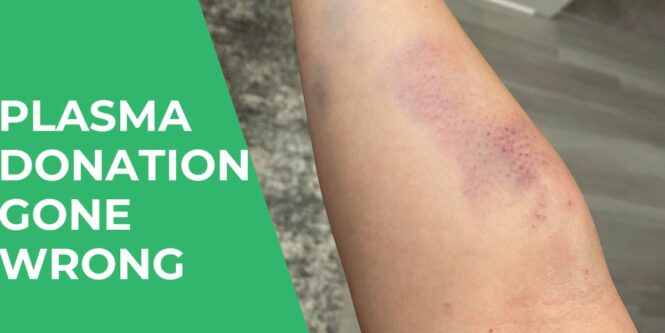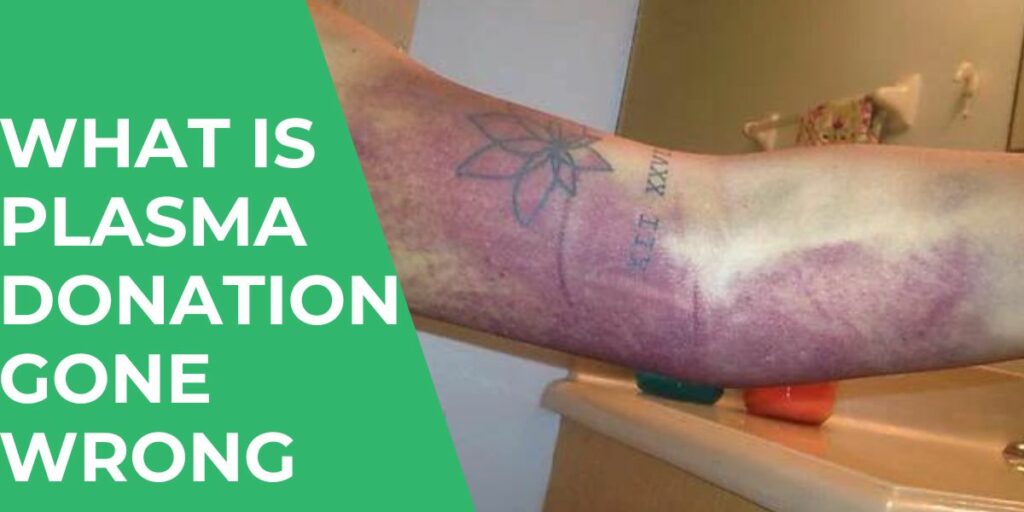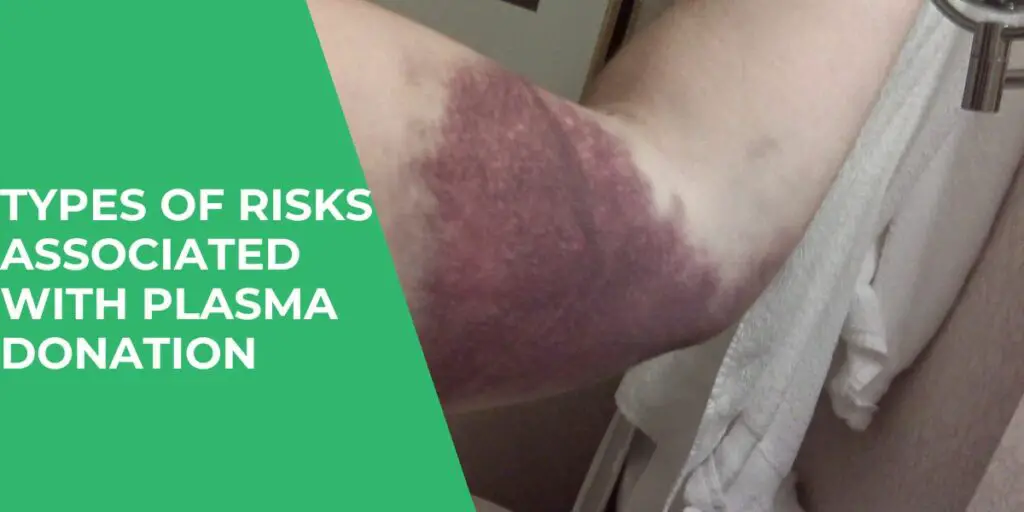
I did not know Plasma donation could go wrong until I saw it happen to a colleague.
While plasma donation is generally a simple and safe process, it can sometimes go wrong.
Knowing the risks and making an informed decision before donating plasma is important. Therefore, keep reading as I share with you details on Plasma Donation Gone Wrong.
What is Plasma Donation Gone Wrong?

Plasma donation gone wrong refers to instances where donors experience negative side effects after donating plasma.
This includes Allergic reactions, fainting, or infections. It’s important to understand the risks before donating.
Do you know the actual reason why your elbow is checked during plasma donation? Check my article Why Do They Check Your Elbows When Donating Plasma for valuable insights.
Plasma Donation Gone Wrong: Common Complications
These are some complications that occur when plasma donation goes wrong along with how to prevent them:
1. Allergic Reactions
An allergic reaction is a possible side effect of plasma donation, and it can manifest as hives, itching, or difficulty breathing.
How to Prevent Allergic Reactions
Donors should be more open to the medical staff to prevent this complication. This includes informing the staff of any allergy or medical condition that can make them susceptible to allergic reactions.
Check out this post to know what are the Long Term Side Effects of Donating Plasma Regularly.
2. Fainting
This is a common complication that occurs during plasma donation. It is often caused by dehydration or low blood sugar.
How to Prevent Fainting
To prevent this complication, donors should stay hydrated before and after donating and avoid donating on an empty stomach.
3. Infections
Infections such as hepatitis B or C can occur if the donation center does not follow proper sterilization protocols or uses unclean needles or supplies.
How to Prevent Infections
To prevent this complication, donors should ensure that the donation center follows proper sterilization protocols and uses new, sterile needles and supplies for each donation.
4. Bruising or Bleeding at The Needle Site
When donating plasma, bruising or bleeding at the needle site is a common complication.
How to Prevent Infections Bruising or bleeding
To prevent this, donors should not tense their muscles during the donation process. They should apply pressure to the needle site after the donation is complete.
5. Low Blood Pressure
Low blood pressure can occur during or after plasma donation, causing dizziness or lightheadedness.
How to Prevent Low Blood Pressure
To prevent this, donors should stay hydrated and inform the medical staff if they have a history of low blood pressure.
6. Nausea or Vomiting
Nausea or vomiting can occur due to the donation process. This is often caused by dehydration or low blood sugar.
How to Prevent Nausea or Vomiting
To prevent this complication, donors should stay hydrated before and after donating and avoid donating on an empty stomach.
7. Dizziness or Lightheadedness
Dizziness or lightheadedness can occur during or after plasma donation.
How to Prevent Dizziness or Lightheadedness
To prevent this complication, donors should stay hydrated and avoid donating plasma on an empty stomach.
For a deep understanding of the citrate reactions that can occur after plasma donation, check my post on Citrate Reaction After Plasma Donation.
Plasma Donation Gone Wrong: Legal and Ethical Considerations
Some of the legal and ethical considerations regarding plasma donation include the following:
- Informed Consent: Donors must give informed consent before donating plasma. They must understand the risks and benefits of donating plasma. They also have the right to withdraw consent to donate plasma at any time.
- Donor Eligibility: Donation centers must follow strict guidelines for donor eligibility. The eligibility guideline includes age, weight, and medical history.
- Confidentiality: Donation centers must protect the donor’s confidential information. This includes their medical history and personal information.
- Sterilization and Safety Protocols: Donation centers must follow strict sterilization and safety protocols to prevent the spreading of infectious diseases.
- Compensation: Donors can receive compensation for their plasma donations within legal and ethical guidelines.
- Research: Plasma donations can be used for research purposes. Donation centers must follow ethical guidelines and obtain informed consent from the donor.
- Marketing and Recruitment: Donation centers must follow ethical guidelines. This includes avoiding coercive or misleading tactics when marketing and recruiting donors.
What to Do When Donating Plasma Goes Wrong
If donating plasma goes wrong, informing the medical staff is essential. They will assess the situation and provide appropriate treatment. It’s also important to report the incident to the donation center’s management and follow up with a healthcare provider if necessary.
What Can Go Wrong When Donating Plasma
Here is a list of complications that can occur when donating plasma:
- Allergic reactions
- Fainting
- Infections
- Bruising or bleeding at the needle site
- Low blood pressure
- Nausea or vomiting
- Dizziness or lightheadedness
Plasma Donation Gone Wrong: How to Prevent Yourself from It
Take the following steps to prevent Plasma Donation Gone Wrong:
- Stay hydrated by drinking plenty of fluids before and after donation.
- Eat a healthy meal before donating to help maintain blood sugar levels.
- Avoid caffeine and alcohol before donating.
- Inform the staff of any medical conditions or medications you are taking.
- Remain seated for a few minutes after donation to prevent dizziness or lightheadedness.
- Avoid strenuous activity or heavy lifting for a few hours after donation.
- Follow any instructions given by the staff regarding post donation care.
Types of Risks Associated With Plasma Donation

These are the risks associated with plasma donation:
- Physical risks, such as infection, allergic reactions, and fainting
- Legal risks related to informed consent and donor eligibility
- Ethical risks related to confidentiality, compensation, research, and marketing and recruitment practices.
What Are the Symptoms of A Bad Plasma Donation?
Here is a list of symptoms that may indicate a bad plasma donation:
- Fever
- Chills
- Redness or swelling at the needle site
- Nausea
- Vomiting
- Dizziness or lightheadedness
- Shortness of breath
Can Something Bad Happen from Donating Plasma?
Potential risks of donating plasma include physical complications such as infection or allergic reactions. There are also legal or ethical considerations, such as informed consent or compensation. However, most plasma donations are safe and successful with proper screening and care.
Why Did My Plasma Donation Fail
Here are some common reasons why a plasma donation may fail:
- Low protein levels.
- Dehydration.
- Low body weight.
- Recent illness or infection.
- Certain medications or medical conditions.
- Inadequate vein size or placement.
- Insufficient blood flow during the donation process.
Frequently Asked Questions on Plasma Donation Gone Wrong
These are the frequently asked questions about Plasma Donation Gone Wrong:
How Can Plasma Donation Risks Be Minimized?
To minimize risks associated with plasma donation, follow the donation center’s instructions and report any adverse reactions or symptoms to the donation center staff.
What Should I Do if I Experience Complications During Plasma Donation?
If you experience complications during plasma donation, inform the medical staff.
Does Donating Plasma Weaken You?
Donating plasma does not typically weaken the body, as the plasma is quickly replenished. However, staying hydrated and resting adequately after the donation is important to avoid potential side effects.
Conclusion
Plasma donation can save lives, but sometimes there are cases when Plasma Donation Gone Wrong.
Complications can arise during or after donation. You need to be aware of these complications and know how to avoid them. Legal and ethical considerations also play a crucial role in plasma donation.
To minimize the risks associated with plasma donation, follow the guidelines the donation center provides. This includes disclosing medical conditions and staying hydrated before and after the procedure.
Donating plasma can be a rewarding experience, but it’s crucial to prioritize your health and safety. Always consult medical professionals if you have any complications.
